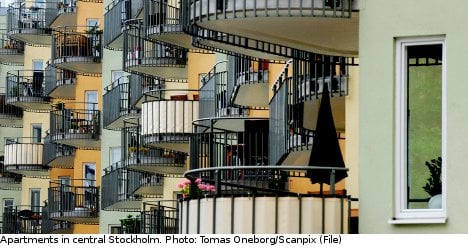Average prices for tenant-owner apartments in central areas of Stockholm have climbed to 62,365 kronor ($9,600) per square metre, according to the latest Swedish Estate Agency Statistics (Svensk Mäklarstatistik).
“The supply of both tenant-owner flats and houses is lower than at the same time last year… There is a high demand for flats and we have more activity in the market in comparison with the same period last year,” Peeter Pütsep, head of real estate agency Svensk Fastighetsförmedling, said in a statement.
SEE ALSO: Check out the latest home listings in The Local’s Property Section
Flat prices have risen by 7 percent nationwide in the first quarter, while house prices climbed one percent.
Central Gothenburg is also enjoying an all time high, with flat prices up 2 percent in March to an average of 40,465 kronor/square metre.
Only Malmö of the major Swedish cities remains below all time high prices, although flat prices increased in the greater Malmö by 1 percent in March, with central areas unchanged at an average of 20,457 kronor/square metre.
Despite the strong growth to date in 2013, Pütsep expects prices to continue to rise.
“The price rise we have seen for apartments can very well continue as there is a housing shortage in many places. This underlines the need to build more homes across the country, especially in areas with a large influx of people,” he said.
The wintry weather has negatively impacted the holiday home market however with some 5,030 properties sold in the 12 months to end March, a decline of 2 percent on the previous 12 month period.
“The season for holiday homes is delayed probably four to six weeks because of the weather. The sellers want to be able to show off the garden a little bit,” Pütsep said.
SEE ALSO: Find your next home with The Local’s Rentals Section
Peter Vinthagen Simpson




 Please whitelist us to continue reading.
Please whitelist us to continue reading.
Member comments